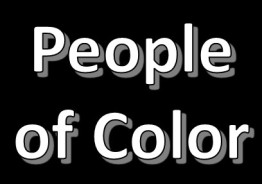Definition:
Dictionary definition: N/A
Antiracist definition: people not categorized as ‘white’
Differences:
The phrase “people of color” (or POCs) is used to replace terms like “minorities” or “non-whites,” which are both considered problematic because they can reinforce the idea that whiteness is “normal” and that other races or ethnicities are deviations from this norm.
Examples:
“our cultural catastrophes are often hidden – the vast and sad realities of trauma and terror visited upon vulnerable fellow citizens who are disproportionately poor people, LGBTQ people, peoples of color, women, and children.” – Cornel West, Race Matters, p. xvii
“Calling the police on people of color engaging in normal social behaviors is an indication that not only are people uncomfortable and threatened with people of color existing in a public space, but also that these people of color are unwelcome in these communities, and that they are perceived as not belonging.” – Victoria Gagliardo-Silver, “White people, just mind your business and let people of color exist,” USA Today, July 20, 2018
Positives:
The term “people of color” is a positive way to designate racial minority groups in the U.S. While the phrase is semantically equivalent to “non-whites,” it calls attention to the fact that these groups should not be defined as the negation of ‘whites.’ (Think of how whites might react if they were routinely classified as ‘non-blacks’ or ‘non-Asians’!)
Biblically, the recognition that ‘whites’ are not a racial norm against which other people are measured is absolutely correct. Jesus commissioned the church to bring the gospel to every nation and every people (Matt. 28:19), and all Christians enjoy equal in standing in Christ (Col. 3:11). Consequently, no racial, ethnic, or cultural group can claim the status as the ‘default’ or the standard against which others groups are measured.
Demographically, the phrase ‘people of color’ can also remind us that the United States is only one country in a much larger world. While ‘whites’ are the majority here, they are minorities in terms of the world’s population as a whole.
Negatives:
One possible objection to the phrase “people of color” is that it lumps people of very different races, ethnicities, and cultures into a single group. The rationale for this approach is unclear. Certainly, critical theory would argue that “people of color” can be treated as a group because they find solidarity in their common experience of oppression. However, the phrase itself is neutral and doesn’t demand this interpretation.
A second objection is that “people of color” are occasionally treated as if they have unique access to truths unavailable to whites, an idea that once again finds its roots in critical theory. Thus, in certain circles, the label “person of color” can be treated as if it confers special status in discussions about race or ethnicity. (This is, of course, an odd idea, since it’s unclear what special insight that a recent immigrant from Pakistan would have into U.S. race relations solely by virtue of being a “person of color.”) Yet, once again, I don’t think this objection is very weighty. One can use the phrase “people of color” without accepting this additional assumption.
Finally, which demographic groups qualify as “people of color” is an open question within the antiracist community. Jewish people are the prime example of this phenomenon. While many Jewish people are not immediately recognizable as ‘non-white,’ Jews have faced unimaginable racial hatred throughout history, and would not have been accepted as ‘white’ a few decades ago. Similarly, there is ongoing debate over how Eastern Europeans, biracial people (like myself), and even Asian-Americans should be categorized. Notwithstanding these exceptions, I think that the phrase “people of color” designates a fairly identifiable group of people and is therefore useful.
Summary:
While Christians should be aware of the ways in which critical theory can inform the significance we assign to the designation “people of color,” the phrase itself seems unproblematic. And it can serve as a helpful reminder that God’s kingdom will include people from every tribe, nation, and tongue, only a small fraction of which will belong to our particular ethnic group.
Related articles:
